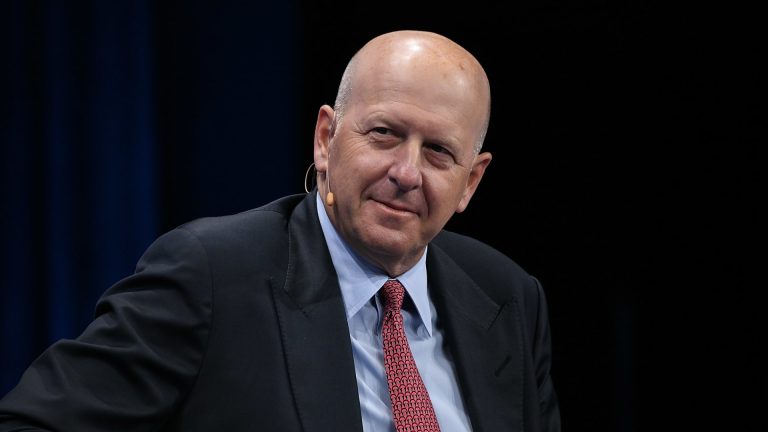Goldman Sachs is known as Wall Street’s top brand, a juggernaut employing some of the world’s best traders and investment bankers.
But it’s facing an inflection point: Those high-profile businesses have fallen out of favor with investors since the 2008 financial crisis. Instead, it’s been steady, fee-generating areas like wealth and asset management that are valued far more than boom-or-bust activities like trading or advising on mergers.
Goldman shares have been stuck at a relatively low price-to-tangible-book value, a key industry metric that measures how the market sizes up a firm compared to the value of its hard assets. Goldman trades for just above one times price to TBV, while rivals including JPMorgan Chase and Morgan Stanley are valued at roughly double that.
Which is why Goldman CEO David Solomon has hitched his fortunes to asset and wealth management. His latest move positions Goldman to take advantage of two big trends in finance: The rise of alternative assets including private equity and growth in the fortunes of the ultrarich.
Still, concerns surfaced recently after former asset management co-head Julian Salisbury departed Goldman for a smaller rival. Salisbury, who was most recently chief investment officer for AWM, is joining San Francisco-based private equity firm Sixth Street. His former co-head, Luke Sarsfield, also left earlier this year, helping fuel worries about a brain drain at the firm.
Goldman, which put former trading co-head Marc Nachmann in charge of AWM in October, says the company has a deep bench and that the average tenure of partners is its longest in a decade.
What is asset management, exactly?
Simply put, Goldman portfolio managers make bets across the universe of financial instruments, either on behalf of clients or using the bank’s own funds.
That runs the gamut from the least risky, plain-vanilla holdings like money market funds, to fixed-income products like corporate bonds funds, stock ETFs and mutual funds, and finally to alternative assets including private equity, private credit (i.e. loans to corporations), real estate and hedge funds.
Compared to rivals JPMorgan and Morgan Stanley, which are big players in traditional assets like stock funds, Goldman is more weighted to the esoteric world of alternative investments, which is why it’s sometimes said that Goldman wants to build a “mini-Blackstone” within the bank.
Goldman gets paid through management and incentive fees, which swell as funds attract more assets. Altogether, Goldman has $2.71 trillion in assets under supervision as of June 30, which includes wealth management assets.
What about wealth management?
The industry has coalesced around a model where financial advisors charge fees, often 1% to 2% of a typical client’s assets annually, to manage investments. They also can earn fees for loans or other products geared towards the wealthy.
Goldman does particularly well with the ultra-rich, defined as those with at least $30 million to invest; it has about 8% of that cohort in the U.S., according to a company presentation. In fact, Goldman’s average ultra-high net worth client keeps about $60 million at the bank.
Where Goldman fares less well is serving the merely rich; it has only about 1% of the high-net worth market, or those who have between $1 million and $10 million to invest.
The bank has more than $1 trillion in wealth management client assets. While significant, key rivals are both larger and growing faster: Morgan Stanley had $4.9 trillion in client assets as of June 30.
Why does it matter?
Goldman is still very much tethered to the ups and downs of Wall Street. The bank’s trading and advisory division generated two-thirds of Goldman’s $23.1 billion in revenues so far this year.
A pandemic-era boom in deals and trading in 2020 and 2021 was quickly followed by a bust, and last quarter marked the industry’s lowest investment banking haul in a decade. That’s caused Goldman to report the steepest profit drop this year of the six biggest U.S. banks, making the push for sustainable sources of growth even more urgent.
For Solomon, who has battled criticism over his ill-fated retail banking push, leadership style and hobbies, success in AWM would provide a welcome counterpoint to those who say he’s made too many errors.
Has it been smooth sailing?
Not exactly. Solomon has made tough decisions to consolidate the various pockets of investment at the firm, and then to focus on raising outside funds while shrinking wagers made with house money. That’s upset some insiders used to autonomy over decades of operation.
He’s also shuffled the deck several times. In a 2020 reorganization, Solomon pulled apart asset and wealth management and assigned Salisbury and later Sarsfield to co-lead the asset manager, a move he reversed when he reunited the businesses and named Nachmann to lead AWM.
That upheaval has led to the departure of the ex-asset management co-heads, as well as other senior leaders.
How’s the business doing now?
Despite the turbulence, AWM has been making progress against its fee and fundraising goals, supporting the idea that Goldman’s reputation for savvy investing gives it an edge.
The bank is on track to reach its goal of generating at least $10 billion in fee revenue by next year. And its total assets under supervision rose by $42 billion to $2.71 trillion in the second quarter.
While Solomon cautioned that Goldman’s “asset management journey” would take two to three years before meaningfully helping margins, he sounded optimistic.
“I feel very, very good about the strategic decisions that we’re making,” Solomon told investors in July. “We see a clear line of sight, and we’re going to make progress.”
Read the full article here









